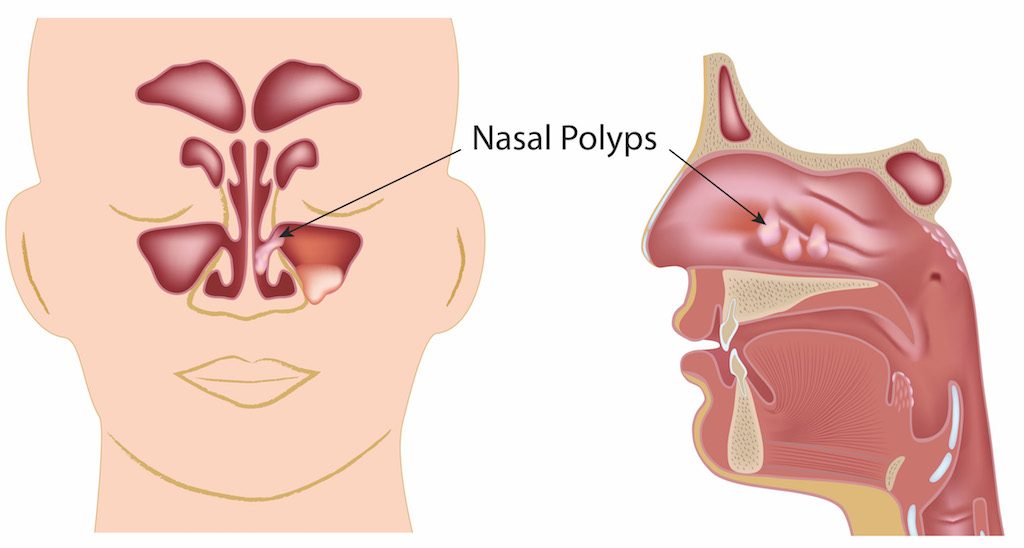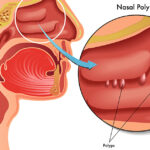Nasal congestion, commonly referred to as a “stuffy nose,” occurs when nasal tissues become swollen due to inflammation of the blood vessels. This condition can be caused by infections, allergies, or irritants and may lead to discomfort, difficulty breathing, and sinus pressure.

Causes of Nasal Congestion
1. Viral Infections
- The common cold and flu are leading causes of nasal congestion.
- Viruses cause inflammation in the nasal passages, leading to swelling and mucus buildup.
2. Allergies
- Allergic rhinitis (hay fever) is a frequent trigger for nasal congestion.
- Pollen, dust, pet dander, and mold can cause the immune system to overreact, leading to nasal swelling.
3. Sinusitis
- Acute and chronic sinus infections can result in prolonged nasal congestion.
- Sinus inflammation leads to blocked nasal passages, causing pressure and discomfort.
4. Environmental Irritants
- Exposure to smoke, strong odors, chemicals, and pollution can irritate nasal tissues, leading to congestion.
5. Structural Issues
- Deviated nasal septum and nasal polyps can obstruct airflow, resulting in chronic nasal blockage.
6. Hormonal Changes
- Pregnancy, thyroid disorders, and hormonal imbalances can contribute to nasal congestion due to increased blood flow in nasal tissues.
Symptoms of Nasal Congestion
- Difficulty breathing through the nose
- Runny or blocked nose
- Sinus pressure or facial pain
- Postnasal drip
- Headaches and ear pressure
- Reduced sense of smell and taste
Diagnosis of Nasal Congestion
Doctors diagnose nasal congestion based on medical history, physical examinations, and diagnostic tests:
- Nasal endoscopy: A thin, flexible tube with a camera is used to examine nasal passages.
- Allergy testing: Identifies allergens responsible for symptoms.
- Imaging (CT scan/X-ray): Helps detect structural abnormalities or chronic sinus infections.
Effective Treatments for Nasal Congestion
1. Home Remedies
- Steam inhalation: Helps loosen mucus and ease nasal blockage.
- Saline nasal sprays: Moisturizes nasal passages and clears irritants.
- Hydration: Drinking plenty of fluids helps thin mucus and prevent dryness.
2. Over-the-Counter Medications
- Decongestants (pseudoephedrine, oxymetazoline): Provide temporary relief but should not be used for more than 3 days to prevent rebound congestion.
- Antihistamines (loratadine, cetirizine): Help manage allergy-related nasal congestion.
- Pain relievers (ibuprofen, acetaminophen): Reduce sinus pressure and discomfort.
3. Medical Treatments
- Prescription nasal sprays (fluticasone, mometasone): Reduce inflammation and swelling in chronic cases.
- Allergy shots (immunotherapy): Helps build tolerance to allergens.
- Surgical intervention: Required for structural issues like a deviated septum or nasal polyps.
Prevention Tips for Nasal Congestion
- Avoid allergens and irritants.
- Maintain indoor humidity levels.
- Practice good hygiene to prevent infections.
- Use an air purifier to reduce airborne allergens.
- Avoid overuse of nasal sprays to prevent dependency.
Nasal congestion is a common condition with multiple causes, ranging from infections to allergies and structural abnormalities. Effective treatments include home remedies, medications, and in some cases, medical intervention. Preventive measures can help reduce the frequency and severity of congestion, ensuring better respiratory health.

